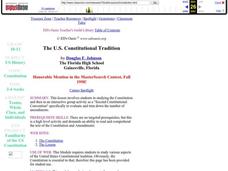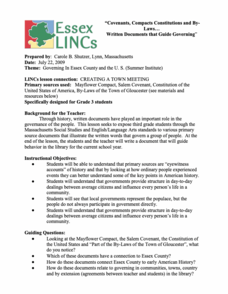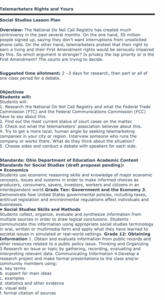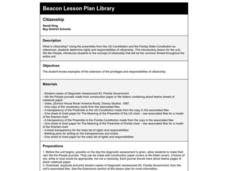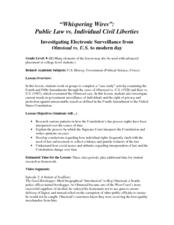Center for Civic Education
Historical Analysis of Constitutional Amendments
Each of the 27 Amendments to the U.S. Constitution were adopted within specific economic, political, social or cultural, and international contexts. As part of their Constitution Day/Week studies, seniors investigate these factors for...
Curated OER
Creating a Classroom Constitution
Youngsters identify and interpret the importance of having rules in order to maintain order at home, at school, in their community, and in the United States. They create a working Classroom Constitution that governs the classroom and...
C-SPAN
The Electoral College and the Constitution
What is the purpose of the Electoral College? Is it antiquated, or does it have a place in today's political climate? High schoolers view a series of video clips as they analyze the parts of the United States Constitution that address...
Curated OER
Philadelphia and the Constitutional Convention "Heat Up"
Students explore the Constitutional Convention of 1787. In this U.S. Constitution lesson, students role play the parts of delegates in a simulation of the convention.
Curated OER
The U.S. Constitutional Tradition
Learners study the Constitution and then in an interactive group activity create a "Second Constitutional Convention" specifically designed to evaluate and trim down the number of amendments.
Curated OER
The Happy Progress of Our Affairs: George Washington and the U.S. Constitution
Students engage in a lesson which uses Washington's own words to illustrate the events leading to the establishment of our national government, and the crucial roles he played throughout that process.
PBS
Evolution of the Presidency: Theodore Roosevelt to Franklin D. Roosevelt
How much power should a president be allowed to exert? Theodore Roosevelt and Franklin D. Roosevelt exercised their power according to their interpretations of the United States Constitution, and these interpretations affected the...
Curated OER
Searching for Answers
How does a judge in the federal judicial court decide on a verdict? Give your middle and high schoolers a better idea of how final decisions are made in the judicial system. Then split your class into four groups, assigning each group a...
Curated OER
Presidential Powers
Students study and discuss the section of the Constitution that refers to the executive branch. They write a new section or clause describing a new duty for the president of the United States. Students define the word power and proposal.
Project Tahoe
Does the Use of Torture on Enemy Combatants Violate the 8th Amendment?
Tackle ethics in your high school history classes with a Socratic seminar about torture as a means for obtaining information. The plan allows for pupils to take the reins during the seminar. On the first day, class members read several...
Curated OER
The Constitution Lives! How it Protects Your Rights Today
Young scholars brainstorm their rights as Americans. For this The Constitution Lives! lesson, students discern the difference between rights and rules by completing a worksheet. Young scholars consider the differences between types of...
Curated OER
Constitution Day
Students discuss the need for rules in their community and classroom. Using this information, they identify the authority figures at their house, at school and in the community. They are read a book about following the rules and listen...
Curated OER
Covenants, Compacts, Constitutions and By-Laws... Written Documents that Guide Governing
Third graders discuss documents in our government. In this government lesson, 3rd graders look up vocabulary words and illustrate them. They examine a historical document to discuss and answer questions.
Curated OER
Teaching with Poster Art: World War I Posters
Students interpret historical evidence presented in primary resources. In this World War I lesson plan, students examine World War I posters. Students investigate the use of propaganda strategies in the posters and discuss the visual...
Curated OER
D-day Message from General Eisenhower to General Marshall
Students analyze a "top secret" document written by Eisenhower. They identify and chart cliches for those about to go into battle and read related poetry. They invite a veteran to describe the D-Day invasion.
Curated OER
George Mason and the Constitution
Students read various articles about the political beliefs of George Mason. In groups, they describe the major events of his life that formed his beliefs and values. They also analyze his contributions to the Constitution and the Bill...
Curated OER
Picture Books and the Bill of Rights
Students identify the basic freedoms of citizens in the United States. For this Bill of Rights lesson, students act out scenarios about the Bill of Rights. Students create a picture book describing the rights they've acted out.
Curated OER
Learning About the Kumeyaay Indians
Third graders research the Native American nation of Kumeyaay. Scholars use the internet to research past history. Through email, 3rd graders communicate with a Kumeyaay child to discover life on a present day reservation. They create a...
Curated OER
Telemarketers Rights and Yours
Students research the controversy of whether or not the National Do Not Call Registry is constitutional, and then hold a class debate. Students research the National Do Not Call Registry, the FTC, the FCC, and the most current status of...
Curated OER
Citizenship
Fifth graders read the preamble of the U.S. and Florida Constitutions. They discuss vocabulary definitions surrounding the concept of citizenship. They discuss and write about the rights and responsibilities of citizens and apply their...
Curated OER
"Whispering Wires": Public Law vs. Individual Civil Liberties
High school student love discussing controversial issues like those brought up in this fourth amendment case study. They examine the 1928 Olmstead vs. U.S. prohibition court case, applying the fourth amendment to determine whether or not...
Curated OER
Free To Speak And Free To Post?
High schoolers research online and in books city statutes regarding posting signs on utility poles, interview appropriate officials about ordinances and how completely it is enforced, explore what has happened elsewhere when citizens...
Curated OER
The False Parliamentarism of 1791 (3rd Canadian constitution)
Students gain an understanding of the concept of false parliamentarism after the Constitutional Act. They, in groups, represent different members of government as they draft, debate and try to pass a bill into law.
Curated OER
Government by the People
Students explore the concept of philanthropy. In this service learning lesson, students examine primary documents regarding the founding of the United States. Students analyze section of the U.S. Constitution and the Declaration of...






